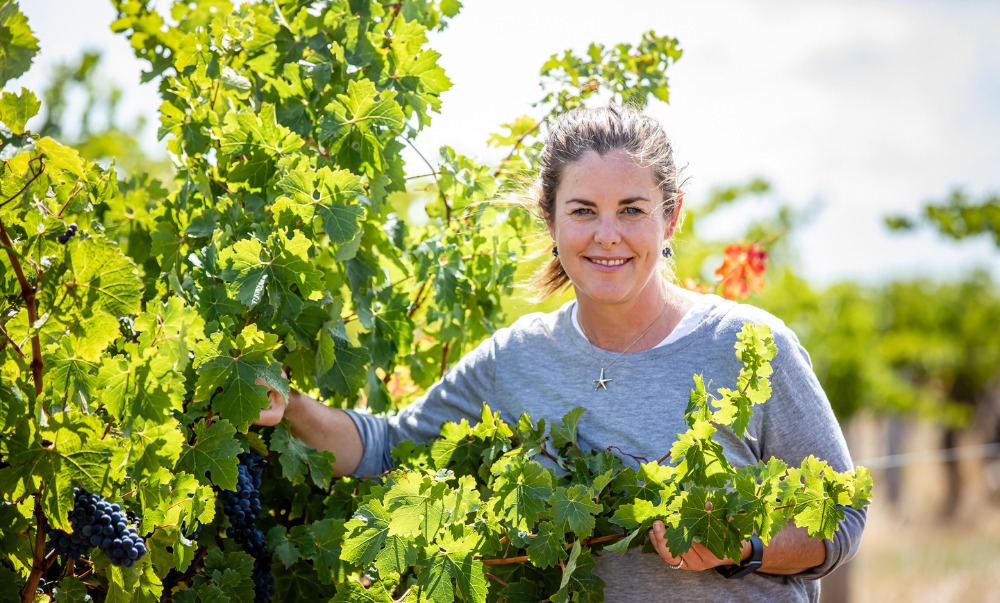Dr Catherine Kidman is part of the team behind the innovative viticulture practices at Wynns Coonawarra Estate. As a Technical Viticulturist and esteemed researcher, Catherine has dedicated her career to unravelling the secrets of Cabernet Sauvignon and shaping the future of grape cultivation in Australia.
Since joining Wynns in 2011, Catherine has been at the forefront of cutting-edge trials and the integration of new technologies to enhance vine and wine quality, while focusing on making the vineyards more environmentally sustainable in the face of a changing climate.
Among her many accolades, Catherine was also named ASVO Viticulturist of the Year for 2023. She also serves as a mentor and advocate for women in the wine sector.
Catherine generously agreed to take time out during the busy harvest season to take part in a filming day in Melbourne for the Drinks Association’s upcoming International Women’s Day luncheon.
We couldn’t let her leave without taking the opportunity to ask her a few questions about her fascinating career in wine.
How long have you been with Wynns Coonawarra and what do you do there?
I started with Wynns Coonawarra in 2011 as a Technical Viticulturist. I contribute to the research and development and the technical program for our Wynns vineyards.
What does a day in the life of a viticulturist look like?
It's quite varied, and it definitely depends on the season. At the moment, we're just about to start vintage. It's a really exciting time because it's where the fruits of your labour come to life.
There’s always a lot of season and climate analysis going on with my role to figure out what the season might look like, which helps us to proactively plan our viticulture techniques throughout the season. At the moment in our vineyard, we are preparing our vines for the upcoming harvest, we are maturity sampling to check the Baume, flavour and ripeness of the grapes, and we are ensuring our vineyards are balanced through canopy management and irrigation.
Another part of my role is to try and bridge the gap between academia and practical grape growing, which involves taking the new research from our universities and seeing how this works in our vineyards at Wynns. I'm always keen to learn about new ideas and techniques, so it’s exciting to have access to new, groundbreaking ways of looking at our vineyards.
We tend to give our varieties personality types when it comes to understanding water stress in the vineyards. Generally, our vines fall into two categories: optimists and pessimists. This categorisation helps us know what to look for in the vineyard when it comes to water stress.
Shiraz is an optimist; it shows its feelings, we can tell when it's thirsty, and it responds to any drink we give it. On the other hand, Cabernet Sauvignon behaves like a pessimist, and it doesn’t show how thirsty it is. These personality traits are important to know because it helps us understand thresholds for water stress. If we can better understand and mitigate unnecessary stress, we end up with beautiful fruit and tannins and those lovely, Cabernet fruit characteristics that we love.
When and how did your fascination with wine begin?
I always had a fascination with nature, plants, biology and microbiology at school. I stumbled across viticulture and winemaking in year 12, and it sort of ticked all the boxes for me. I studied it at uni and loved the research component of it so much that I ended up doing my PhD.
A lot of individuality goes into the way people craft wines, and while it's quite scientific, there's a lot of artistry to the craft as well. I love that my role lets me walk the line between art and science and nature, it’s very unique.

What does the future hold for the industry?
I think the future of viticulture is bright. While there are definitely technology and data elements at the forefront of making us future fit, we are also seeing a fabulous push towards greater environmental and sustainable practices.
The next step is to continue to push for greater diversity in people of different genders, experiences, and nationalities in viticulture. We also need to address succession planning and attract people from diverse backgrounds into our wine and growing communities.
What advice would you give to women who have a passion for wine and viticulture and want to pursue a career in the vineyard?
There are many opportunities for females in viticulture. We are seeing more and more workplaces becoming more flexible to enable work-life balance for working parents.
I'm a working mother, and while it can be a juggle, I love what I do, which is important. My role revolves around a strong environmental focus, so I love that my kids can grow up on a farm surrounded by vineyards and that we are part of a strong community that values the land.
We are moving into an era where it's time to flip the narrative on traditional ways of doing things and challenge the status quo. While there are times when you need to physically be there for vintage and other seasonal requirements, increasingly, we are finding ways to do things better and smarter through new technology, e.g. remote sensing and more accurate data feeds, which means we can be more selective with how we manage our time in and out of the vineyards.